Taxation Law Assignment: CGT, Depreciation, and Business Assets
VerifiedAdded on 2022/11/14
|7
|2310
|235
Homework Assignment
AI Summary
This Taxation Law assignment analyzes two key scenarios. The first involves Jasmine, an Australian resident selling various assets upon retirement, including her main residence, a car, furniture, and paintings. The analysis focuses on the application of Capital Gains Tax (CGT) exemptions, considering factors like the main residence rule, personal use assets, and collectibles, as per ATO guidelines. The second scenario examines John's business, which manufactures motor vehicle accessories, and the import and installation of a CNC machine. The assignment delves into calculating the machine's cost for depreciation purposes, including purchase price, travel expenses, and installation costs, and determines the appropriate date for commencing depreciation based on UCA rules and the machine's use in the business. The assignment also explores the impact of subsequent improvements, like the installation of a guiding rod, on the depreciation calculation. References to ATO and business.gov.au guidelines support the analysis.
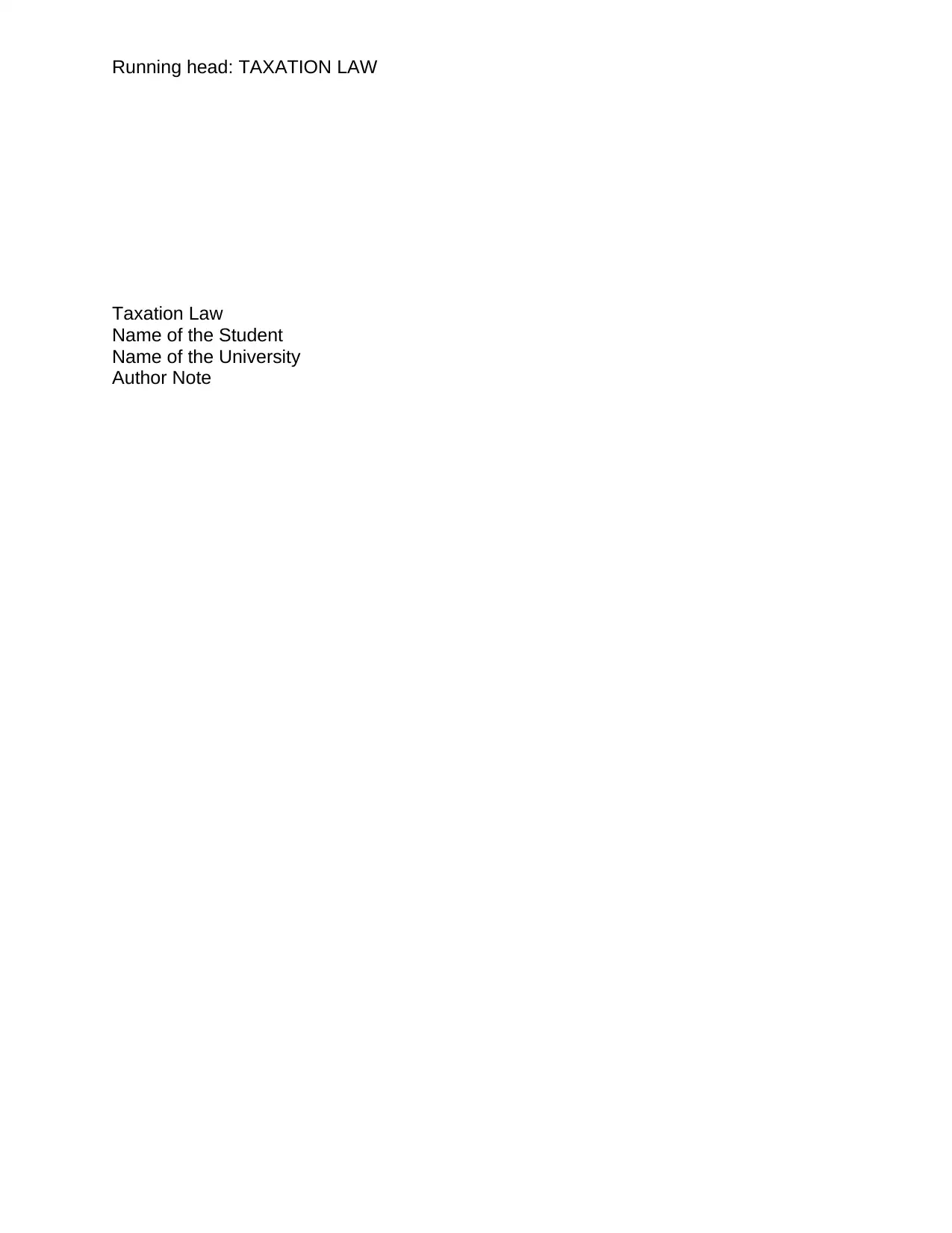
Running head: TAXATION LAW
Taxation Law
Name of the Student
Name of the University
Author Note
Taxation Law
Name of the Student
Name of the University
Author Note
Paraphrase This Document
Need a fresh take? Get an instant paraphrase of this document with our AI Paraphraser

1TAXATION LAW
Table of Contents
Question 1......................................................................................................................2
Question 2......................................................................................................................3
References.....................................................................................................................6
Table of Contents
Question 1......................................................................................................................2
Question 2......................................................................................................................3
References.....................................................................................................................6
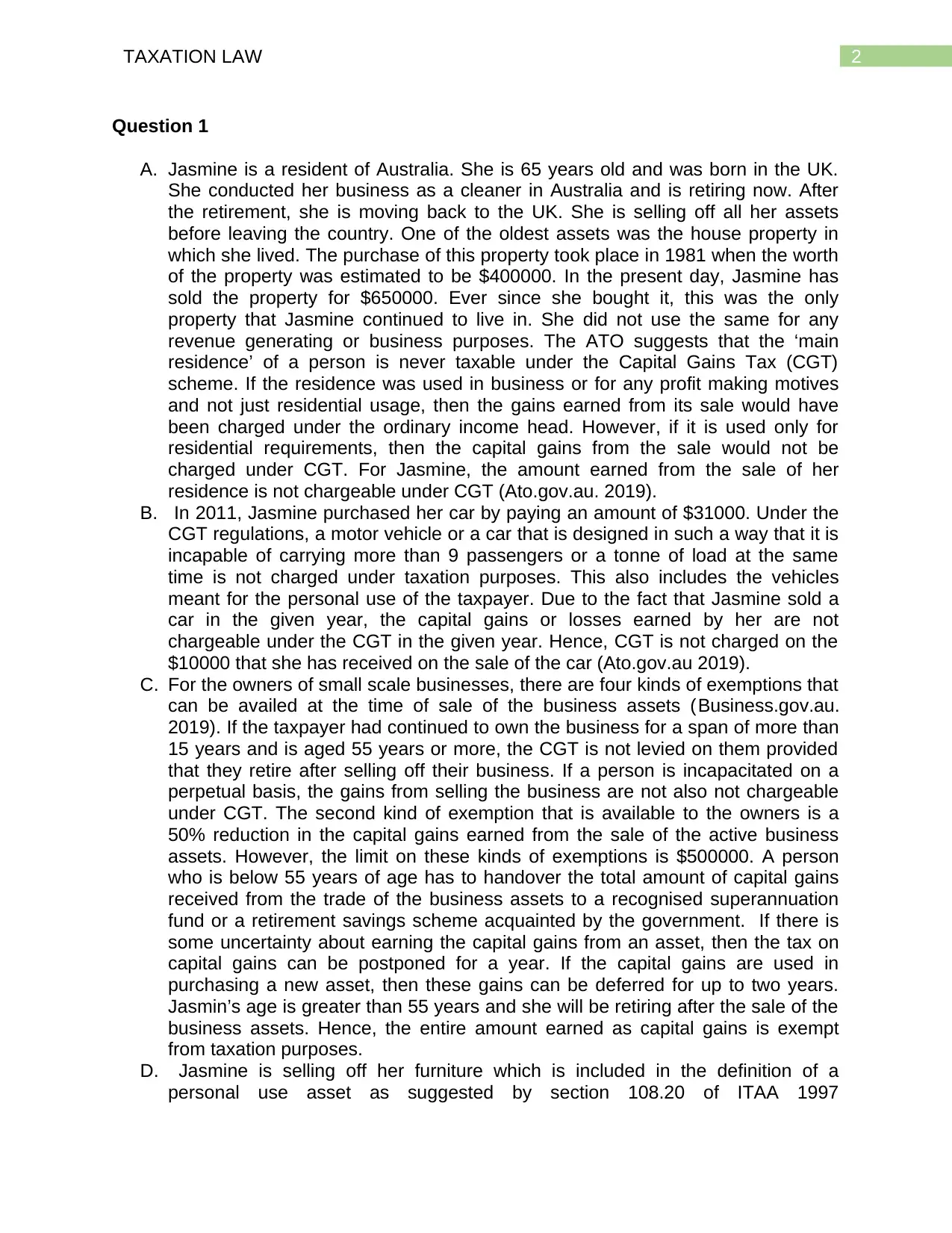
2TAXATION LAW
Question 1
A. Jasmine is a resident of Australia. She is 65 years old and was born in the UK.
She conducted her business as a cleaner in Australia and is retiring now. After
the retirement, she is moving back to the UK. She is selling off all her assets
before leaving the country. One of the oldest assets was the house property in
which she lived. The purchase of this property took place in 1981 when the worth
of the property was estimated to be $400000. In the present day, Jasmine has
sold the property for $650000. Ever since she bought it, this was the only
property that Jasmine continued to live in. She did not use the same for any
revenue generating or business purposes. The ATO suggests that the ‘main
residence’ of a person is never taxable under the Capital Gains Tax (CGT)
scheme. If the residence was used in business or for any profit making motives
and not just residential usage, then the gains earned from its sale would have
been charged under the ordinary income head. However, if it is used only for
residential requirements, then the capital gains from the sale would not be
charged under CGT. For Jasmine, the amount earned from the sale of her
residence is not chargeable under CGT (Ato.gov.au. 2019).
B. In 2011, Jasmine purchased her car by paying an amount of $31000. Under the
CGT regulations, a motor vehicle or a car that is designed in such a way that it is
incapable of carrying more than 9 passengers or a tonne of load at the same
time is not charged under taxation purposes. This also includes the vehicles
meant for the personal use of the taxpayer. Due to the fact that Jasmine sold a
car in the given year, the capital gains or losses earned by her are not
chargeable under the CGT in the given year. Hence, CGT is not charged on the
$10000 that she has received on the sale of the car (Ato.gov.au 2019).
C. For the owners of small scale businesses, there are four kinds of exemptions that
can be availed at the time of sale of the business assets (Business.gov.au.
2019). If the taxpayer had continued to own the business for a span of more than
15 years and is aged 55 years or more, the CGT is not levied on them provided
that they retire after selling off their business. If a person is incapacitated on a
perpetual basis, the gains from selling the business are not also not chargeable
under CGT. The second kind of exemption that is available to the owners is a
50% reduction in the capital gains earned from the sale of the active business
assets. However, the limit on these kinds of exemptions is $500000. A person
who is below 55 years of age has to handover the total amount of capital gains
received from the trade of the business assets to a recognised superannuation
fund or a retirement savings scheme acquainted by the government. If there is
some uncertainty about earning the capital gains from an asset, then the tax on
capital gains can be postponed for a year. If the capital gains are used in
purchasing a new asset, then these gains can be deferred for up to two years.
Jasmin’s age is greater than 55 years and she will be retiring after the sale of the
business assets. Hence, the entire amount earned as capital gains is exempt
from taxation purposes.
D. Jasmine is selling off her furniture which is included in the definition of a
personal use asset as suggested by section 108.20 of ITAA 1997
Question 1
A. Jasmine is a resident of Australia. She is 65 years old and was born in the UK.
She conducted her business as a cleaner in Australia and is retiring now. After
the retirement, she is moving back to the UK. She is selling off all her assets
before leaving the country. One of the oldest assets was the house property in
which she lived. The purchase of this property took place in 1981 when the worth
of the property was estimated to be $400000. In the present day, Jasmine has
sold the property for $650000. Ever since she bought it, this was the only
property that Jasmine continued to live in. She did not use the same for any
revenue generating or business purposes. The ATO suggests that the ‘main
residence’ of a person is never taxable under the Capital Gains Tax (CGT)
scheme. If the residence was used in business or for any profit making motives
and not just residential usage, then the gains earned from its sale would have
been charged under the ordinary income head. However, if it is used only for
residential requirements, then the capital gains from the sale would not be
charged under CGT. For Jasmine, the amount earned from the sale of her
residence is not chargeable under CGT (Ato.gov.au. 2019).
B. In 2011, Jasmine purchased her car by paying an amount of $31000. Under the
CGT regulations, a motor vehicle or a car that is designed in such a way that it is
incapable of carrying more than 9 passengers or a tonne of load at the same
time is not charged under taxation purposes. This also includes the vehicles
meant for the personal use of the taxpayer. Due to the fact that Jasmine sold a
car in the given year, the capital gains or losses earned by her are not
chargeable under the CGT in the given year. Hence, CGT is not charged on the
$10000 that she has received on the sale of the car (Ato.gov.au 2019).
C. For the owners of small scale businesses, there are four kinds of exemptions that
can be availed at the time of sale of the business assets (Business.gov.au.
2019). If the taxpayer had continued to own the business for a span of more than
15 years and is aged 55 years or more, the CGT is not levied on them provided
that they retire after selling off their business. If a person is incapacitated on a
perpetual basis, the gains from selling the business are not also not chargeable
under CGT. The second kind of exemption that is available to the owners is a
50% reduction in the capital gains earned from the sale of the active business
assets. However, the limit on these kinds of exemptions is $500000. A person
who is below 55 years of age has to handover the total amount of capital gains
received from the trade of the business assets to a recognised superannuation
fund or a retirement savings scheme acquainted by the government. If there is
some uncertainty about earning the capital gains from an asset, then the tax on
capital gains can be postponed for a year. If the capital gains are used in
purchasing a new asset, then these gains can be deferred for up to two years.
Jasmin’s age is greater than 55 years and she will be retiring after the sale of the
business assets. Hence, the entire amount earned as capital gains is exempt
from taxation purposes.
D. Jasmine is selling off her furniture which is included in the definition of a
personal use asset as suggested by section 108.20 of ITAA 1997
⊘ This is a preview!⊘
Do you want full access?
Subscribe today to unlock all pages.

Trusted by 1+ million students worldwide
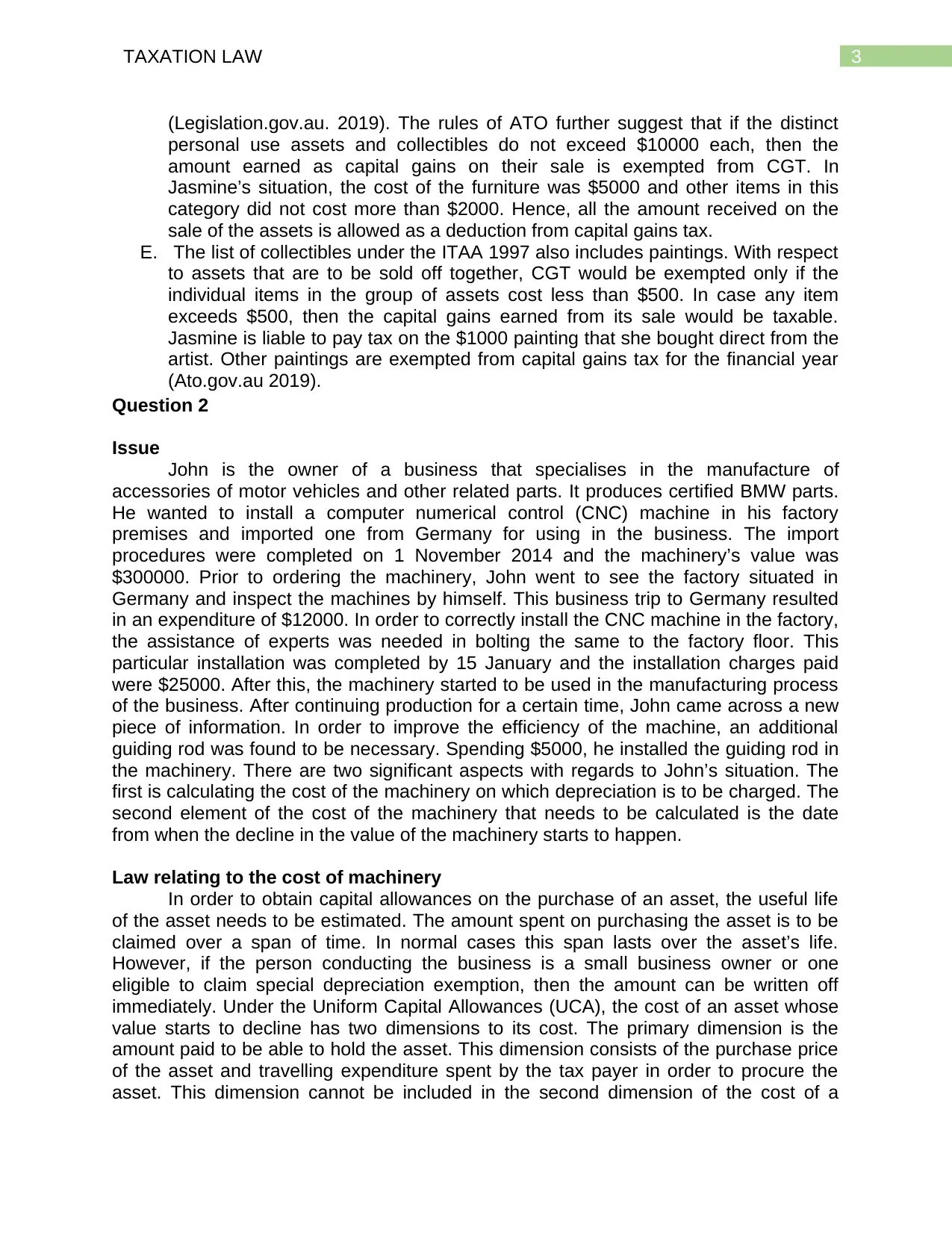
3TAXATION LAW
(Legislation.gov.au. 2019). The rules of ATO further suggest that if the distinct
personal use assets and collectibles do not exceed $10000 each, then the
amount earned as capital gains on their sale is exempted from CGT. In
Jasmine’s situation, the cost of the furniture was $5000 and other items in this
category did not cost more than $2000. Hence, all the amount received on the
sale of the assets is allowed as a deduction from capital gains tax.
E. The list of collectibles under the ITAA 1997 also includes paintings. With respect
to assets that are to be sold off together, CGT would be exempted only if the
individual items in the group of assets cost less than $500. In case any item
exceeds $500, then the capital gains earned from its sale would be taxable.
Jasmine is liable to pay tax on the $1000 painting that she bought direct from the
artist. Other paintings are exempted from capital gains tax for the financial year
(Ato.gov.au 2019).
Question 2
Issue
John is the owner of a business that specialises in the manufacture of
accessories of motor vehicles and other related parts. It produces certified BMW parts.
He wanted to install a computer numerical control (CNC) machine in his factory
premises and imported one from Germany for using in the business. The import
procedures were completed on 1 November 2014 and the machinery’s value was
$300000. Prior to ordering the machinery, John went to see the factory situated in
Germany and inspect the machines by himself. This business trip to Germany resulted
in an expenditure of $12000. In order to correctly install the CNC machine in the factory,
the assistance of experts was needed in bolting the same to the factory floor. This
particular installation was completed by 15 January and the installation charges paid
were $25000. After this, the machinery started to be used in the manufacturing process
of the business. After continuing production for a certain time, John came across a new
piece of information. In order to improve the efficiency of the machine, an additional
guiding rod was found to be necessary. Spending $5000, he installed the guiding rod in
the machinery. There are two significant aspects with regards to John’s situation. The
first is calculating the cost of the machinery on which depreciation is to be charged. The
second element of the cost of the machinery that needs to be calculated is the date
from when the decline in the value of the machinery starts to happen.
Law relating to the cost of machinery
In order to obtain capital allowances on the purchase of an asset, the useful life
of the asset needs to be estimated. The amount spent on purchasing the asset is to be
claimed over a span of time. In normal cases this span lasts over the asset’s life.
However, if the person conducting the business is a small business owner or one
eligible to claim special depreciation exemption, then the amount can be written off
immediately. Under the Uniform Capital Allowances (UCA), the cost of an asset whose
value starts to decline has two dimensions to its cost. The primary dimension is the
amount paid to be able to hold the asset. This dimension consists of the purchase price
of the asset and travelling expenditure spent by the tax payer in order to procure the
asset. This dimension cannot be included in the second dimension of the cost of a
(Legislation.gov.au. 2019). The rules of ATO further suggest that if the distinct
personal use assets and collectibles do not exceed $10000 each, then the
amount earned as capital gains on their sale is exempted from CGT. In
Jasmine’s situation, the cost of the furniture was $5000 and other items in this
category did not cost more than $2000. Hence, all the amount received on the
sale of the assets is allowed as a deduction from capital gains tax.
E. The list of collectibles under the ITAA 1997 also includes paintings. With respect
to assets that are to be sold off together, CGT would be exempted only if the
individual items in the group of assets cost less than $500. In case any item
exceeds $500, then the capital gains earned from its sale would be taxable.
Jasmine is liable to pay tax on the $1000 painting that she bought direct from the
artist. Other paintings are exempted from capital gains tax for the financial year
(Ato.gov.au 2019).
Question 2
Issue
John is the owner of a business that specialises in the manufacture of
accessories of motor vehicles and other related parts. It produces certified BMW parts.
He wanted to install a computer numerical control (CNC) machine in his factory
premises and imported one from Germany for using in the business. The import
procedures were completed on 1 November 2014 and the machinery’s value was
$300000. Prior to ordering the machinery, John went to see the factory situated in
Germany and inspect the machines by himself. This business trip to Germany resulted
in an expenditure of $12000. In order to correctly install the CNC machine in the factory,
the assistance of experts was needed in bolting the same to the factory floor. This
particular installation was completed by 15 January and the installation charges paid
were $25000. After this, the machinery started to be used in the manufacturing process
of the business. After continuing production for a certain time, John came across a new
piece of information. In order to improve the efficiency of the machine, an additional
guiding rod was found to be necessary. Spending $5000, he installed the guiding rod in
the machinery. There are two significant aspects with regards to John’s situation. The
first is calculating the cost of the machinery on which depreciation is to be charged. The
second element of the cost of the machinery that needs to be calculated is the date
from when the decline in the value of the machinery starts to happen.
Law relating to the cost of machinery
In order to obtain capital allowances on the purchase of an asset, the useful life
of the asset needs to be estimated. The amount spent on purchasing the asset is to be
claimed over a span of time. In normal cases this span lasts over the asset’s life.
However, if the person conducting the business is a small business owner or one
eligible to claim special depreciation exemption, then the amount can be written off
immediately. Under the Uniform Capital Allowances (UCA), the cost of an asset whose
value starts to decline has two dimensions to its cost. The primary dimension is the
amount paid to be able to hold the asset. This dimension consists of the purchase price
of the asset and travelling expenditure spent by the tax payer in order to procure the
asset. This dimension cannot be included in the second dimension of the cost of a
Paraphrase This Document
Need a fresh take? Get an instant paraphrase of this document with our AI Paraphraser
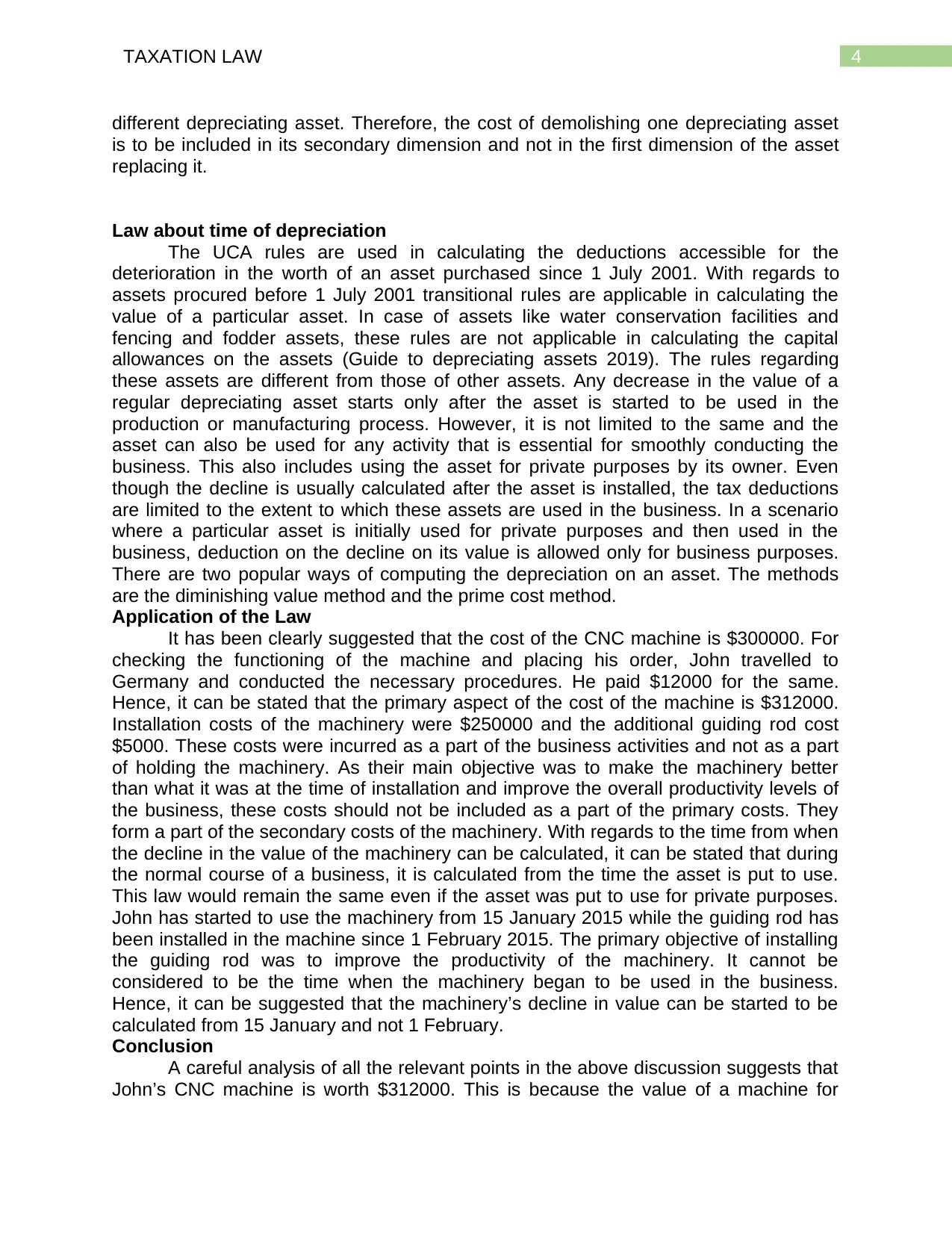
4TAXATION LAW
different depreciating asset. Therefore, the cost of demolishing one depreciating asset
is to be included in its secondary dimension and not in the first dimension of the asset
replacing it.
Law about time of depreciation
The UCA rules are used in calculating the deductions accessible for the
deterioration in the worth of an asset purchased since 1 July 2001. With regards to
assets procured before 1 July 2001 transitional rules are applicable in calculating the
value of a particular asset. In case of assets like water conservation facilities and
fencing and fodder assets, these rules are not applicable in calculating the capital
allowances on the assets (Guide to depreciating assets 2019). The rules regarding
these assets are different from those of other assets. Any decrease in the value of a
regular depreciating asset starts only after the asset is started to be used in the
production or manufacturing process. However, it is not limited to the same and the
asset can also be used for any activity that is essential for smoothly conducting the
business. This also includes using the asset for private purposes by its owner. Even
though the decline is usually calculated after the asset is installed, the tax deductions
are limited to the extent to which these assets are used in the business. In a scenario
where a particular asset is initially used for private purposes and then used in the
business, deduction on the decline on its value is allowed only for business purposes.
There are two popular ways of computing the depreciation on an asset. The methods
are the diminishing value method and the prime cost method.
Application of the Law
It has been clearly suggested that the cost of the CNC machine is $300000. For
checking the functioning of the machine and placing his order, John travelled to
Germany and conducted the necessary procedures. He paid $12000 for the same.
Hence, it can be stated that the primary aspect of the cost of the machine is $312000.
Installation costs of the machinery were $250000 and the additional guiding rod cost
$5000. These costs were incurred as a part of the business activities and not as a part
of holding the machinery. As their main objective was to make the machinery better
than what it was at the time of installation and improve the overall productivity levels of
the business, these costs should not be included as a part of the primary costs. They
form a part of the secondary costs of the machinery. With regards to the time from when
the decline in the value of the machinery can be calculated, it can be stated that during
the normal course of a business, it is calculated from the time the asset is put to use.
This law would remain the same even if the asset was put to use for private purposes.
John has started to use the machinery from 15 January 2015 while the guiding rod has
been installed in the machine since 1 February 2015. The primary objective of installing
the guiding rod was to improve the productivity of the machinery. It cannot be
considered to be the time when the machinery began to be used in the business.
Hence, it can be suggested that the machinery’s decline in value can be started to be
calculated from 15 January and not 1 February.
Conclusion
A careful analysis of all the relevant points in the above discussion suggests that
John’s CNC machine is worth $312000. This is because the value of a machine for
different depreciating asset. Therefore, the cost of demolishing one depreciating asset
is to be included in its secondary dimension and not in the first dimension of the asset
replacing it.
Law about time of depreciation
The UCA rules are used in calculating the deductions accessible for the
deterioration in the worth of an asset purchased since 1 July 2001. With regards to
assets procured before 1 July 2001 transitional rules are applicable in calculating the
value of a particular asset. In case of assets like water conservation facilities and
fencing and fodder assets, these rules are not applicable in calculating the capital
allowances on the assets (Guide to depreciating assets 2019). The rules regarding
these assets are different from those of other assets. Any decrease in the value of a
regular depreciating asset starts only after the asset is started to be used in the
production or manufacturing process. However, it is not limited to the same and the
asset can also be used for any activity that is essential for smoothly conducting the
business. This also includes using the asset for private purposes by its owner. Even
though the decline is usually calculated after the asset is installed, the tax deductions
are limited to the extent to which these assets are used in the business. In a scenario
where a particular asset is initially used for private purposes and then used in the
business, deduction on the decline on its value is allowed only for business purposes.
There are two popular ways of computing the depreciation on an asset. The methods
are the diminishing value method and the prime cost method.
Application of the Law
It has been clearly suggested that the cost of the CNC machine is $300000. For
checking the functioning of the machine and placing his order, John travelled to
Germany and conducted the necessary procedures. He paid $12000 for the same.
Hence, it can be stated that the primary aspect of the cost of the machine is $312000.
Installation costs of the machinery were $250000 and the additional guiding rod cost
$5000. These costs were incurred as a part of the business activities and not as a part
of holding the machinery. As their main objective was to make the machinery better
than what it was at the time of installation and improve the overall productivity levels of
the business, these costs should not be included as a part of the primary costs. They
form a part of the secondary costs of the machinery. With regards to the time from when
the decline in the value of the machinery can be calculated, it can be stated that during
the normal course of a business, it is calculated from the time the asset is put to use.
This law would remain the same even if the asset was put to use for private purposes.
John has started to use the machinery from 15 January 2015 while the guiding rod has
been installed in the machine since 1 February 2015. The primary objective of installing
the guiding rod was to improve the productivity of the machinery. It cannot be
considered to be the time when the machinery began to be used in the business.
Hence, it can be suggested that the machinery’s decline in value can be started to be
calculated from 15 January and not 1 February.
Conclusion
A careful analysis of all the relevant points in the above discussion suggests that
John’s CNC machine is worth $312000. This is because the value of a machine for
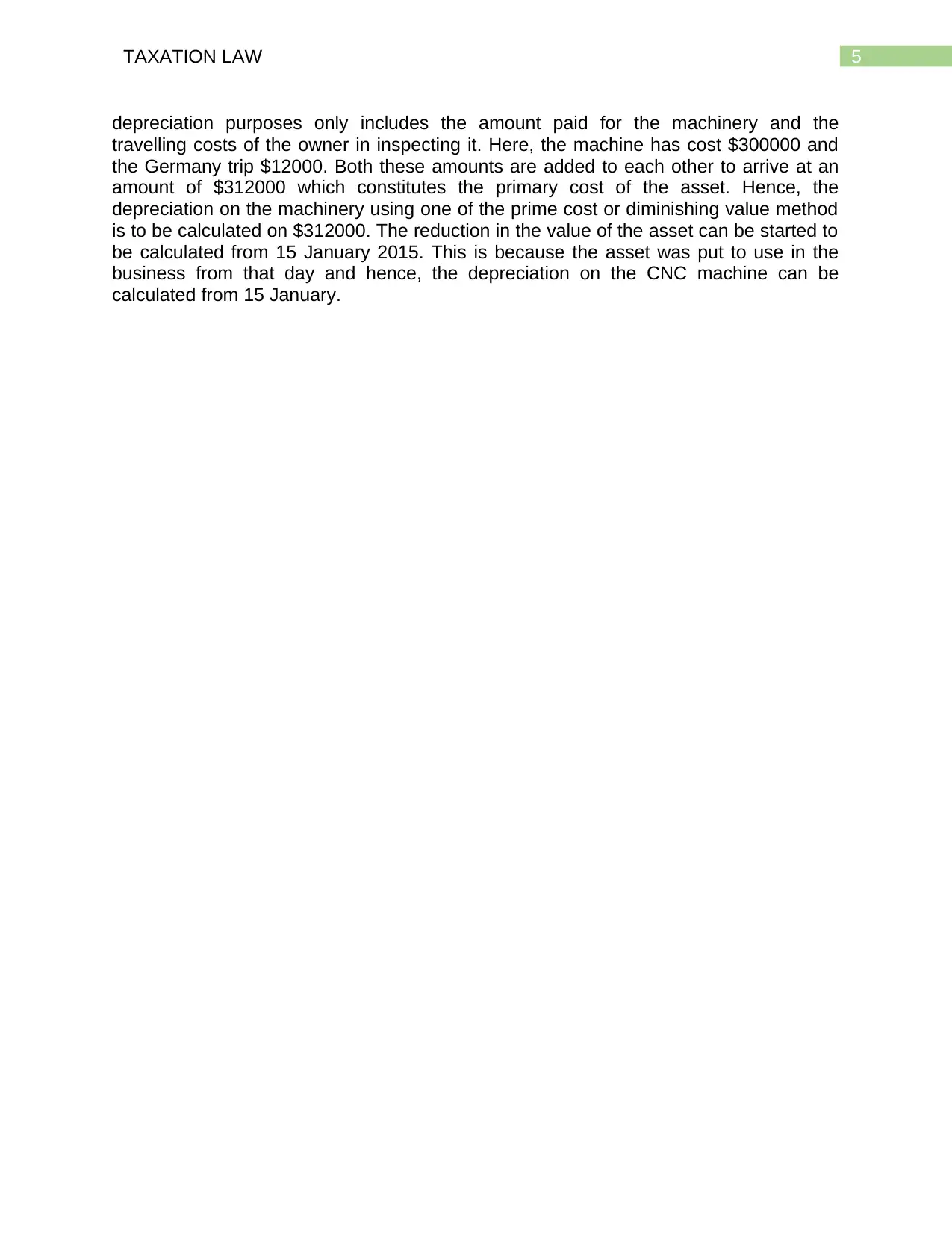
5TAXATION LAW
depreciation purposes only includes the amount paid for the machinery and the
travelling costs of the owner in inspecting it. Here, the machine has cost $300000 and
the Germany trip $12000. Both these amounts are added to each other to arrive at an
amount of $312000 which constitutes the primary cost of the asset. Hence, the
depreciation on the machinery using one of the prime cost or diminishing value method
is to be calculated on $312000. The reduction in the value of the asset can be started to
be calculated from 15 January 2015. This is because the asset was put to use in the
business from that day and hence, the depreciation on the CNC machine can be
calculated from 15 January.
depreciation purposes only includes the amount paid for the machinery and the
travelling costs of the owner in inspecting it. Here, the machine has cost $300000 and
the Germany trip $12000. Both these amounts are added to each other to arrive at an
amount of $312000 which constitutes the primary cost of the asset. Hence, the
depreciation on the machinery using one of the prime cost or diminishing value method
is to be calculated on $312000. The reduction in the value of the asset can be started to
be calculated from 15 January 2015. This is because the asset was put to use in the
business from that day and hence, the depreciation on the CNC machine can be
calculated from 15 January.
⊘ This is a preview!⊘
Do you want full access?
Subscribe today to unlock all pages.

Trusted by 1+ million students worldwide
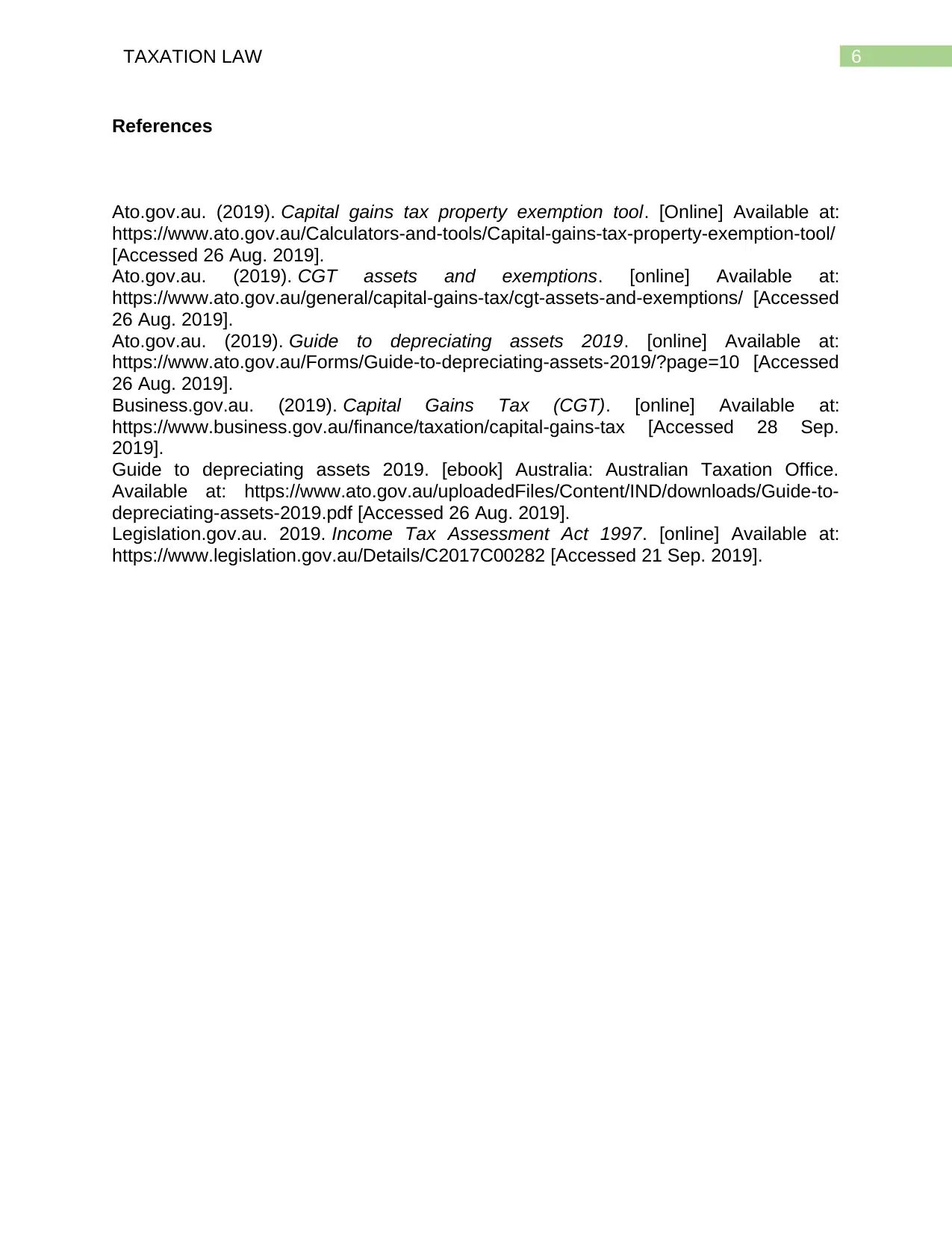
6TAXATION LAW
References
Ato.gov.au. (2019). Capital gains tax property exemption tool. [Online] Available at:
https://www.ato.gov.au/Calculators-and-tools/Capital-gains-tax-property-exemption-tool/
[Accessed 26 Aug. 2019].
Ato.gov.au. (2019). CGT assets and exemptions. [online] Available at:
https://www.ato.gov.au/general/capital-gains-tax/cgt-assets-and-exemptions/ [Accessed
26 Aug. 2019].
Ato.gov.au. (2019). Guide to depreciating assets 2019. [online] Available at:
https://www.ato.gov.au/Forms/Guide-to-depreciating-assets-2019/?page=10 [Accessed
26 Aug. 2019].
Business.gov.au. (2019). Capital Gains Tax (CGT). [online] Available at:
https://www.business.gov.au/finance/taxation/capital-gains-tax [Accessed 28 Sep.
2019].
Guide to depreciating assets 2019. [ebook] Australia: Australian Taxation Office.
Available at: https://www.ato.gov.au/uploadedFiles/Content/IND/downloads/Guide-to-
depreciating-assets-2019.pdf [Accessed 26 Aug. 2019].
Legislation.gov.au. 2019. Income Tax Assessment Act 1997. [online] Available at:
https://www.legislation.gov.au/Details/C2017C00282 [Accessed 21 Sep. 2019].
References
Ato.gov.au. (2019). Capital gains tax property exemption tool. [Online] Available at:
https://www.ato.gov.au/Calculators-and-tools/Capital-gains-tax-property-exemption-tool/
[Accessed 26 Aug. 2019].
Ato.gov.au. (2019). CGT assets and exemptions. [online] Available at:
https://www.ato.gov.au/general/capital-gains-tax/cgt-assets-and-exemptions/ [Accessed
26 Aug. 2019].
Ato.gov.au. (2019). Guide to depreciating assets 2019. [online] Available at:
https://www.ato.gov.au/Forms/Guide-to-depreciating-assets-2019/?page=10 [Accessed
26 Aug. 2019].
Business.gov.au. (2019). Capital Gains Tax (CGT). [online] Available at:
https://www.business.gov.au/finance/taxation/capital-gains-tax [Accessed 28 Sep.
2019].
Guide to depreciating assets 2019. [ebook] Australia: Australian Taxation Office.
Available at: https://www.ato.gov.au/uploadedFiles/Content/IND/downloads/Guide-to-
depreciating-assets-2019.pdf [Accessed 26 Aug. 2019].
Legislation.gov.au. 2019. Income Tax Assessment Act 1997. [online] Available at:
https://www.legislation.gov.au/Details/C2017C00282 [Accessed 21 Sep. 2019].
1 out of 7
Related Documents
Your All-in-One AI-Powered Toolkit for Academic Success.
+13062052269
info@desklib.com
Available 24*7 on WhatsApp / Email
![[object Object]](/_next/static/media/star-bottom.7253800d.svg)
Unlock your academic potential
Copyright © 2020–2026 A2Z Services. All Rights Reserved. Developed and managed by ZUCOL.





